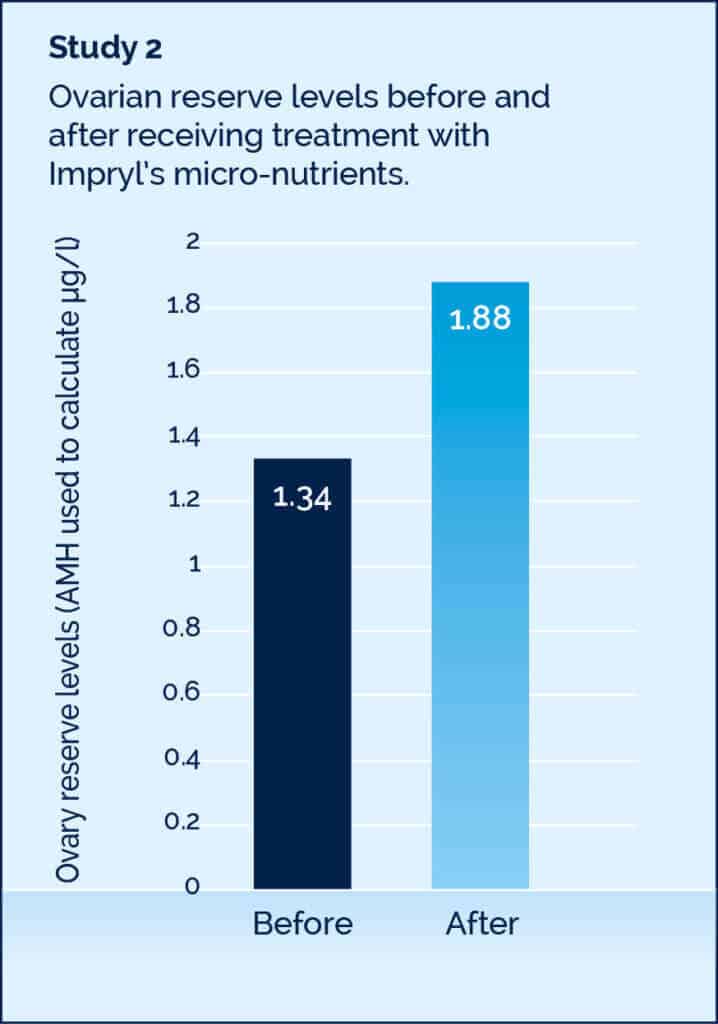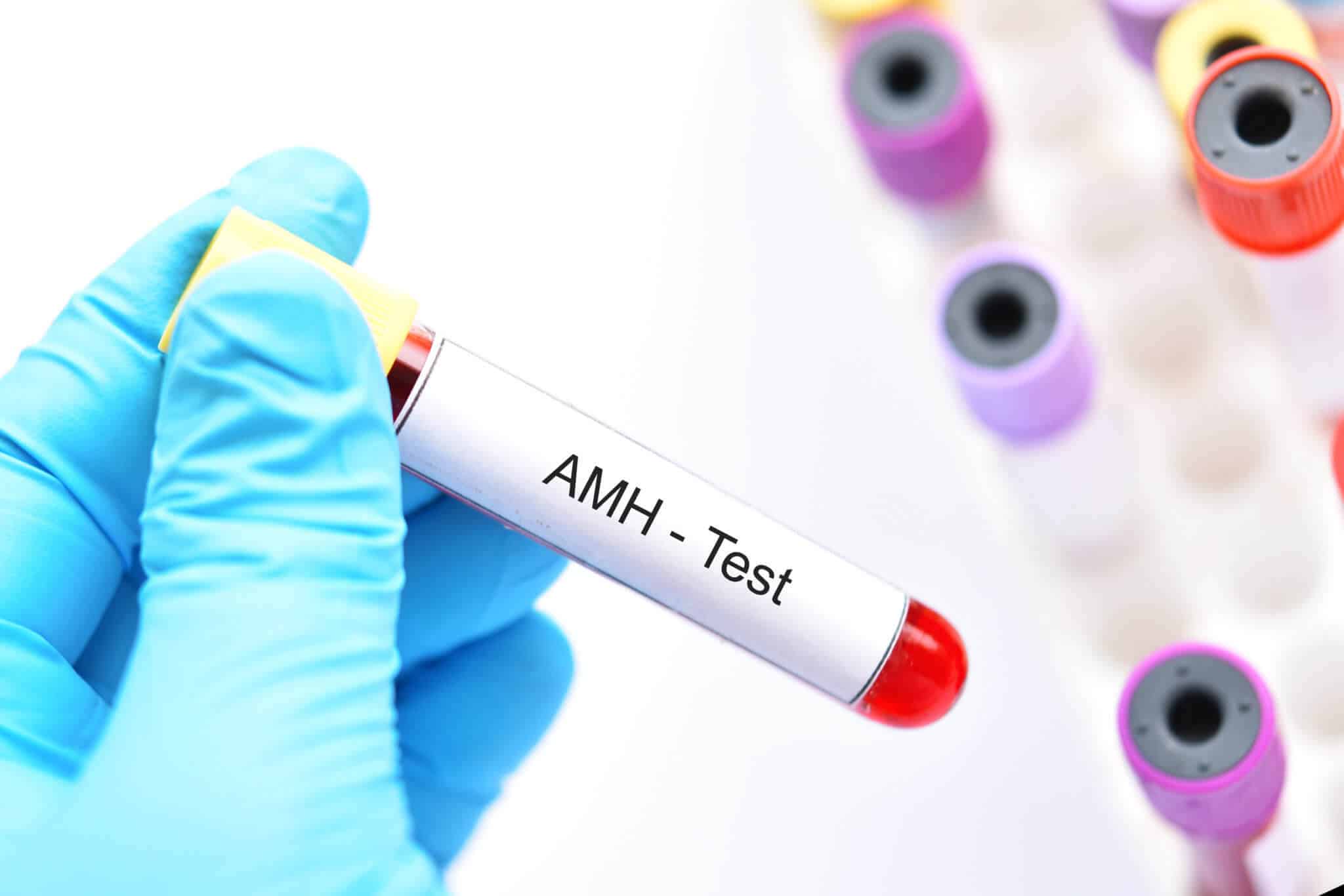It is possible to increase your AMH levels naturally. You can encourage your body to naturally raise levels of AMH by eating a diet which is rich in necessary nutrients, such as vitamin D. There is also research that shows women taking the micronutrients present in Impryl actually experienced increased AMH levels.
What is AMH?
AMH is actually produced in both male and female reproductive organs but it is usually only measured in women. This is because the follicles developing in a woman’s ovaries produce AMH. The basic concept is that the more eggs you have, the higher your AMH levels are and vice versa. This is why AMH levels are measured prior to IVF as the results help to evaluate ovarian reserve and assist clinics in planning for your procedures and medication. It is important to remember that AMH levels are a key indicator in the quantity of eggs remaining but do not provide a reliable indicator of the quality of the eggs which are being produced.
Why do I have low AMH?
AMH levels tend to decline as you get older – this is simply due to the fact you are born with all your eggs and these deplete as time passes by. This does not necessarily mean that if you are young that your AMH levels will be perfect; lifestyle (smoking/diet) and natural (genetics/illness) factors can lead to lower levels and complications. (1)
AMH Levels and Fertility
If you have ever looked into having a fertility MOT you may have heard of Anti-Müllerian Hormone (AMH) levels. A fertility MOT — measuring AMH or antral follicle count (AFC) — will assess your ovarian reserve. (2)
What are AMH levels and what do they mean for you?
Developing egg sacs (ovarian follicles) secrete AMH. The more eggs there are remaining in the ovaries, the higher the level of AMH in your bloodstream. So a low level of AMH is thought to be a sign of low ovarian reserve (a low number of developing egg sacs). A low level of AMH is normal for a woman nearing the menopause.
A ‘normal’ AMH level is considered to be 1.0 ng/mL to 3.0 ng/mL. Very low AMH is considered to be an AMH below 1.05 ng/ml and anything below 0.16 ng/ml is said to be an ‘undetectably low’ AMH level.
Possible causes of a low AMH include:
- Your age — as you grow older your AMH levels will naturally decline
- Surgery for endometriosis or ovarian cysts
- An autoimmune condition
- Your DNA
Understanding AMH Test Results
An AMH test is a useful indicator of eggs remaining in a woman’s ovarian reserve. A ‘normal’ AMH level is considered to be 1.0 ng/mL to 3.0 ng/mL. Low AMH is considered to be an AMH below 0.9 ng/ml and anything below 0.16 ng/ml is said to be an ‘undetectably low’ AMH level. Varying AMH levels can indicate different fertility issues in women.
AMH levels naturally decrease with age, but a particularly low AMH for your age could point to the possibility of early menopause. Very High AMH levels can be an indicator of polycystic ovary syndrome (PCOS). Your test results will provide information on how many eggs you have left, but not on the quality or health of those eggs, so this should be considered alongside other fertility measures.
How can AMH levels improve naturally?
It is well documented that increasing age correlates with a drop in AMH levels, reflecting poor ovarian reserve as the menopause approaches. However, it is normal for AMH levels to fluctuate from one cycle to another, which means that although certain factors cause a natural decline in levels, they can also improve naturally too, and this does not always follow what appears to be a traceable pattern. While it may be difficult to predict when you will have months with a higher or lower AMH level, one way to encourage your body to naturally raise levels of AMH is to eat a diet which is rich in necessary nutrients, such as vitamin D.
Low AMH Levels for Fertility
The good news is that although low AMH means that you have a low ovarian reserve, it doesn’t mean that you will not be able to conceive naturally. It is completely possible to get pregnant with your own eggs or donor eggs with low AMH. After all, it just takes one healthy egg.
Your AMH level won’t tell the whole of your fertility story — there are other ways to boost your fertility. If you are struggling you may be advised to try IVF, but it all depends on your personal situation. Getting pregnant naturally may be less likely if the levels fall below low, but you will be able to discuss all the options with your doctor.
Start your journey with Impryl today
The fertility supplement for both men and women
Can AMH levels fluctuate?
Yes, AMH levels fluctuate. Being told that you have low AMH levels may feel very disheartening, but many women get pregnant naturally despite this. The AMH tests don’t tell the whole story because of the AMH fluctuation. Some months you may have higher levels of AMH (therefore higher levels of maturing eggs) compared to other months when you have lower AMH levels (fewer eggs maturing).
In addition, measurements of AMH can vary from lab to lab and from person to person. Even the way the blood is stored can affect the test results. It also does not necessarily predict the chances of conceiving using IVF.
Those with polycystic ovary syndrome (PCOS) often have raised levels of AMH so an AMH test may be less accurate in predicting ovarian reserve in those with PCOS.
When being tested, ask your doctor how much variability can be expected.
What are the Ideal AMH levels for IVF?
Unfortunately, there isn’t an accepted ‘ideal’ AMH level for women trying to get pregnant and looking to go through IVF. Each clinic has its own idea of what that is and how they will go about treating you based on this.
The National Institute for Health and Care Excellence (NICE) state that AMH levels “less than or equal to 5.4 pmol/l for a low response and greater than or equal to 25.0 pmol/l for a high response ” to gonadotrophin stimulation in IVF [https://www.nice.org.uk/guidance/cg156/chapter/Recommendations – section 1.3.3]. Anything in between would be considered a normal responder when taking IVF medication.
What do low AMH levels mean for my chances in IVF?
If you are opting to go through IVF having struggled to conceive then here are a few points for you to consider. Firstly, if you are younger, usually considered below the age of 35 in the fertility world, then low but measurable AMH levels should not worry you too much. You will be prescribed medication which will stimulate your body to produce follicles which are likely to be of good quality given your age. Remember, low AMH does not mean low quality eggs, rather it means lower quantity, which isn’t as important when going through Assisted Reproductive Technologies (ART).
Unfortunately, cancer treatments and early-onset menopause can result in virtually non-existent AMH levels which will make it impossible for you to get pregnant.
If you are older than 35 and have low serum AMH then your chances of success in IVF are sadly greatly reduced, as has been shown in this study Again, this does not mean it will be impossible for you to get pregnant and have a healthy baby but it does significantly reduce your chances.
Can you increase AMH levels?
There is some research that shows women taking the micronutrients present in Impryl actually experienced increased AMH levels.


This study in older women with poor ovarian reserve shows that the micronutrients within Impryl increased AMH levels by 40% and a number of patients became pregnant while taking Impryl during the trial. Previously, it was thought that the only way for these women to get pregnant was through donated eggs.
Impryl provides a balanced support to the body’s metabolism which can help improve the quality of the follicles you produce and is recommended by IVF specialists across the UK to be taken prior to going through IVF. If you’d like to know more about Impryl you can visit the Impryl page on our site.
Low AMH levels with poor nutrient absorption
A study in 2013 found that women with Crohn’s Disease had much lower AMH levels than women who did not have Crohn’s. This was thought to be because those with Crohn’s disease struggle to absorb the essential nutrients needed for conception.
Supplements for low AMH- How Impryl can help
One way of helping you to boost your overall fertility, despite low AMH levels, PCOS or advancing age is to eat a diet rich in necessary nutrients or you can consider taking Impryl — an expertly targeted dietary supplement. Impryl is recommended for all men and women who are attempting to conceive. The nutrients in Impryl are in an active form, so easily absorbed. Impryl helps the sperm and egg to improve their natural antioxidant defences and high energy production — both of which are essential for producing the best quality sperm and eggs needed to create a baby.
Experiencing low AMH levels is a common problem for women when they are trying to conceive, but the micronutrients in Impryl have been proven to increase AMH levels — which can make all the difference to your success.
To see how Impryl has helped our customers, have a read of our real life success stories.









